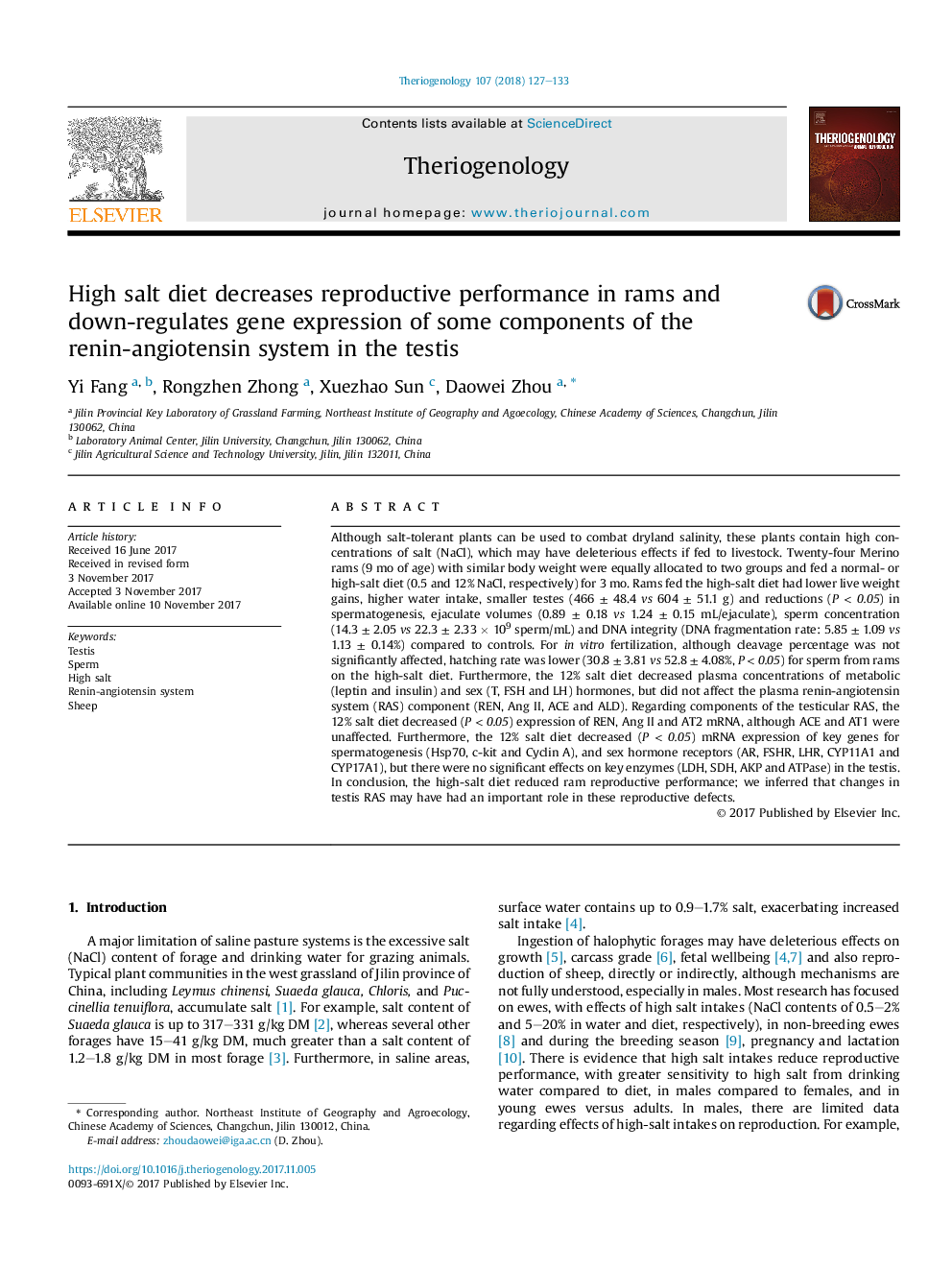| کد مقاله | کد نشریه | سال انتشار | مقاله انگلیسی | نسخه تمام متن |
|---|---|---|---|---|
| 8427683 | 1546062 | 2018 | 7 صفحه PDF | دانلود رایگان |
عنوان انگلیسی مقاله ISI
High salt diet decreases reproductive performance in rams and down-regulates gene expression of some components of the renin-angiotensin system in the testis
ترجمه فارسی عنوان
رژیم کم نمک عملکرد تولید مثل را در قوچ کاهش می دهد و بیان ژن برخی از اجزای سیستم رنین- آنژیوتانسین را در بیضه تنظیم می کند
دانلود مقاله + سفارش ترجمه
دانلود مقاله ISI انگلیسی
رایگان برای ایرانیان
کلمات کلیدی
تست، اسپرم، نمک بالا، سیستم رنین-آنژیوتانسین، گوسفند،
موضوعات مرتبط
علوم زیستی و بیوفناوری
علوم کشاورزی و بیولوژیک
علوم دامی و جانورشناسی
چکیده انگلیسی
Although salt-tolerant plants can be used to combat dryland salinity, these plants contain high concentrations of salt (NaCl), which may have deleterious effects if fed to livestock. Twenty-four Merino rams (9 mo of age) with similar body weight were equally allocated to two groups and fed a normal- or high-salt diet (0.5 and 12% NaCl, respectively) for 3 mo. Rams fed the high-salt diet had lower live weight gains, higher water intake, smaller testes (466 ± 48.4 vs 604 ± 51.1 g) and reductions (P < 0.05) in spermatogenesis, ejaculate volumes (0.89 ± 0.18 vs 1.24 ± 0.15 mL/ejaculate), sperm concentration (14.3 ± 2.05 vs 22.3 ± 2.33 Ã 109 sperm/mL) and DNA integrity (DNA fragmentation rate: 5.85 ± 1.09 vs 1.13 ± 0.14%) compared to controls. For in vitro fertilization, although cleavage percentage was not significantly affected, hatching rate was lower (30.8 ± 3.81 vs 52.8 ± 4.08%, P < 0.05) for sperm from rams on the high-salt diet. Furthermore, the 12% salt diet decreased plasma concentrations of metabolic (leptin and insulin) and sex (T, FSH and LH) hormones, but did not affect the plasma renin-angiotensin system (RAS) component (REN, Ang II, ACE and ALD). Regarding components of the testicular RAS, the 12% salt diet decreased (P < 0.05) expression of REN, Ang II and AT2 mRNA, although ACE and AT1 were unaffected. Furthermore, the 12% salt diet decreased (P < 0.05) mRNA expression of key genes for spermatogenesis (Hsp70, c-kit and Cyclin A), and sex hormone receptors (AR, FSHR, LHR, CYP11A1 and CYP17A1), but there were no significant effects on key enzymes (LDH, SDH, AKP and ATPase) in the testis. In conclusion, the high-salt diet reduced ram reproductive performance; we inferred that changes in testis RAS may have had an important role in these reproductive defects.
ناشر
Database: Elsevier - ScienceDirect (ساینس دایرکت)
Journal: Theriogenology - Volume 107, February 2018, Pages 127-133
Journal: Theriogenology - Volume 107, February 2018, Pages 127-133
نویسندگان
Yi Fang, Rongzhen Zhong, Xuezhao Sun, Daowei Zhou,
